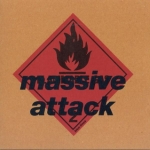
On 8th April 2016 it will be 25 years since Massive Attack released their peerless debut album “Blue Lines”. In other words it will be as old now as great records of Spring 1966 like, say, the Kinks’ “Dedicated Follower of Fashion” or Stevie Wonder’s “Uptight (Everything’s Alright)” were to us in the early 1990s. “Blue Lines” was a hugely influential album – a truly innovative British blend of hip hop, soul and sound-system culture that nodded to the more open minded post punk of say PiL, the Pop Group and Sandinista-era Clash. Its reputation seems a little diminished in 2016 probably due to Massive Attack’s relatively low public profile in the 21st Century, but also the mid to late 90s over-exposure that followed when the British public caught up with what they were doing around the time of third album “Mezzanine”. Yet for better or worse, as an album it pioneered the down-tempo, home listening branch of dance music and few ever got close to its complex, multi-layered beauty.
As a collection its greatest strength is the way that it blends the multiple voices of the collective into a distinctive British outlook without losing coherence. The obvious reference here is the “English upbringing, background Caribbean” line in the title track, echoed in the ‘Subbuteo and Studio One’ couplet from “Five Man Army” but there are many lines in that loose jostling for position on the microphone that reflect the unique mix of decaying urban paranoia and joy that was Bristol in the late 80s. This is an album that could only be British – listen again and you are instantly back there on City Road the yellow sodium street lights reflecting in the puddles on the cobbles outside of the Moon Club, in the windows of the death trap kebab shop near the Tropic Club or on the one way system near the Western Star Domino Club. Jazz musicians absorb multiple influences and styles, internally processing them to forge something new and different when they play – Massive Attack pulled off something similar yet more extraordinary here. Rather than just synthesize the joy of the wonderful music, clubs and parties of late 80s city life they somehow captured the whole environment. So “Blue Lines” channels that gauntlet of suspicion and mistrust that had to be run to get to the gigs, places outside of the ‘heritage rock’, pastel coloured woolen jumpers and stripey shirts that constituted mainstream culture in the immediate post Live Aid era.
At the core of the album is the soulful morality of Horace Andy, who is the only vocalist to contribute to all five main Massive Attack albums to date. Jamaican born Andy contributes “One Love” and “Hymn of the Big Wheel” to the collection, but riffs on his Studio One roots classics “Money Money” and “Skylarking” on the “Five Man Army” jam. It’s the latter track that comes closest to showing all of the albums influences simultaneously – the soulful Al Green sample, the deep deep dub bass, the distinctive clarity of the multiple raps swapping back and forth at the microphone – different personalities emerging for sure but musical alliances and influences in common. There is no preaching, the lyrics have a ‘take it or leave it’ world view a million miles from the hateful, hate-filled,”me first” culture that Mrs Thatcher had imported to Britain in the previous decade. Neither was this a group of entitled suburban rich kids greeting each other with a plummy “Yo”, dressed in designer ‘street’ gear purchased with Daddy’s platinum card. If anything it felt more like a British equivalent of the more conscious contemporary hip hop of artists like A Tribe Called Quest, De La Soul and the Jungle Brothers, who even then had started to lose ground commercially to the lowest common denominator gangster rap fluff.
It is that intense collective solidarity, looking to stand alongside friends and family against what a mostly hostile world throws your way that stands out today. Our society has been atomised into individual screen shaped cocoons – bought off with cheap disposable consumer goods, while successive governments ceded the ability to collect tax from a self-appointed elite. In 1991 “Safe From Harm” sounded pessimistic, defensive, its propulsive Billy Cobham sample belying the lyric of holding onto your loved ones being the best that we could do – in 2016 it sounds proportionate, positively the best possible outcome of some grim options.

Music this focused and passionate is difficult to make. The painter Frank Auerbach is said to build his finished works through painting over many versions of the same subject – travelling multiple routes through the material, digesting the possibilities with each a rehearsal for the one where he knows it is complete. Rather than the stoned laziness of legend, Massive Attack have always sounded like they have much in common with this approach. When they let an album out into the world it feels as if it has been argued over, every rhythm pattern debated to death, every possibility explored. While the results usually justify the approach, it’s a creative process that has clearly taken its toll on the collective. Shara Nelson the voice of the much celebrated hit singles “Unfinished Sympathy” and “Safe From Harm” was first to leave after “Blue Lines”, followed by Tricky after its follow up “Protection”.
The departure of founder member Andrew “Mushroom” Vowles, whose friendship and collaboration with Grant Marshall and Robert del Naja long pre-dated the band, was perhaps the most keenly felt. Vowles apparently felt that the band had moved too far from their hip hop roots with third album “Mezzanine” and the trio have been estranged ever since. By the time of fourth album “100th Window” the prognosis for the band looked bleak when Marshall too left temporarily, leaving Robert del Naja the only original member standing. Thankfully Marshall later rejoined for “Heligoland” and with new material expected to follow the “Ritual Spirit” EP, that sees the return of Tricky after 20 years, the outlook now is better than for many years.
But without that intensity it is arguable that Massive Attack would not have been such an example of how to make credible modern music. Unlike more timid contemporaries, they have given a platform to organisations like Human Rights campaigners Reprieve without embarrassing themselves or boring their audience. It is this consistent, human, world view that serves as a reminder of a time when bands were prepared to articulate beliefs that went beyond buying an expensive car and ostentatious jewelry. The return of Massive Attack this year is something to anticipate, savour and celebrate – but let’s not forget where the story started.



Nice write up. This was a real game-changer for me, I don’t think I’d ever heard a debut LP that was as complete as BL.
LikeLiked by 1 person
I remember being stopped in my tracks by ‘Blue Lines’ when it came out. There are a lot of albums where the odd track makes you stop and listen, this was one where the whole thing was obviously great from the start.
LikeLiked by 2 people
It was such a brilliant mix of musical styles I really liked, with so much originality stirred through the mix too.
LikeLiked by 1 person
Great writing, Phil. I’ve only come across Massive Attack in passing but I’m listening to Blue Lines now on your recommendation and liking it a lot.
LikeLiked by 1 person
Nice piece. I often go back to Massive Attack.
LikeLiked by 1 person